IN ENGLISH
Montenegro: Media and Freedom of Expression, Regular Report 2012
Montenegrin independent media and its journalists have been exposed to new attacks and pressures over this year. These were manifested through physical assaults on journalists, financial pressures and legal proceedings. Not surprisingly, therefore, Montenegro is now ranked lower than in the previous year on the Reporters without borders’ report on media freedoms, where its 107th position is the lowest in the region. In Europe, only Belarus, Russia and Ukraine have lower rankings. The enhancement of media freedom has been one the key requirements for obtaining the date for commencement of EU accession negotiations.
Representatives of the independent media have a huge problem with regard to security and normal functioning of their newsrooms due to the pressures from the criminal and political circles.
The case of Olivera Lakic: Daily Vijesti journalist Olivera Lakic has been physically assaulted in the evening hours on March 7, 2012, in front of her house in downtown Podgorica. Ms Lakic wrote last year a series of articles on illegal production of cigarettes in the northern town of Mojkovac. After that, those in that murky business threatened Ms Lakic and her family in several ways, while the police tried to minimize and cover up the case instead of investigating it thoroughly and protecting the journalist.
A few days after the attack, the police arrested one person, who, according to Ms Lakic's best knowledge, did not have any motive to assault her. She insisted that those who commissioned this act be found. She also announced her withdrawal from journalism, until the state authorities resolve the case.
Earlier this month (December 2012), Montenegrin prosecution authorities examined Milenko Rabrenovic, a police officer employed at the Ministry of Internal Affairs, on suspicion that he threatened Olivera Lakic and her daughter after a series of articles about the illegal cigarette trafficking in Montenegro. Mr Rabrenovic was a driver of the former Head of Montenegrin Police Authority Veselin Veljovic when these texts were published.
The case of Veselin Drljevic: In February of 2012, the editor of daily Dan Veselin Drljevic and the photographer of this paper were assaulted by a group of hooligans who inflicted several injuries on Drljevic's face and body. Perpetrators of this attack were found and legal proceedings against them have begun.
The case of arson of Vijesti vehicles: Police did not find out who are the arsonists who torched vehicles of Vijesti. Fire was set on four vehicles of Vijesti in three night operations. Although the representatives of Police and Government have stated that they are diligently working on resolving these cases, no progress has been made after several months of investigation.
Montenegrin police and judiciary did not manage to solve numerous previous cases of physical endangering of journalists and editors in Montenegro, starting with the 2004 murder of publisher and editor Dusko Jovanovic, the 2008 murder of Srdjan Vojicic, who was a guard of Montenegrin poet Jevrem Brkovic. The same applies to subsequent attacks on Tufik Softic, Zeljko Ivanovic, Mladen Stojovic and others. One of the main requests of massive street protests in 2012 and the petition of media professionals sent to EU officials Baroso and Fule was for these cases to be solved.
The persecution of Mihailo Jovovic, Vijesti's Editor in Chief: Three years upon the physical attack by the Podgorica mayor Miomir Mugosa and his son Miljan Mugosa on Mihailo Jovovic, Editor in Chief of Vijesti, and Boris Pejovic, its photographer, the Court has sentenced only conditionally Mayor's son Miljan, although the court practice for all types of severe injuries similar to the one inflicted by Miljan Mugosa is to impose prison sentences. However, even after such an epilogue, the Prosecution has appealed to the Superior Court, whom it is now asking to reverse its decision and to prosecute instead the Editor in Chief for alleged attack on the Mayor's son.
In August 2009, Jovovic and Pejovic were assaulted by Mayor Mugosa and his son while covering a story on Mayor's repeated illegal parking and the functioning of the city's communal police. The journalists were threatened with a gun by the Mayor's son and Mr. Jovovic was admitted to hospital with a ruptured eardrum. Colluding with the Mayor, police failed to take any evidence from the scene, including the gun, while prosecutors falsely indicted Mr. Jovovic for attacking the Mayor's driver and causing him serious brain injury, contrary to two expert medical opinions.
Treatment of the independent media representatives as criminals and enemies: The representatives of the independent media have been accused for being disloyal to the Montenegrin state and depicted as non-patriotic, even for belonging to the organized crime.
In many public appearances during the last year, the new prime minister and leader of the ruling political party DPS Milo Djukanovic continued the campaign against the independent media. He called the representatives of independent media rodents that need to be deratized. On more than one occasion Djukanovic has repeated that media and civil activists represent a major barrier on the Montenegrin road towards Europe, that they chase away foreign investors by writing about corruption and organized crime, and that they want to bring down the current administration by all means possible.
During the recent campaign for parliamentary elections held on 14 October, Djukanovic and his associates engaged more with the independent media than with the opposition. In his speeches, Djukanovic falsely accused the independent media for coordinating the opposition parties and announced the arrest of Miodrag Perovic, co-founder of daily Vijesti and weekly Monitor. During the campaign, Vijesti's correspondent Goran Malidžan was physically assaulted at a DPS party rally in that city.
Media completely or partially funded by the government publish serials about the representatives of independent media, using the hate language and numerous lies. So, the female journalists and civil activists are called prostitutes, while owners and male journalists are presented as fools, animals and national traitors. In the media controlled by DPS, the attacks on independent media are openly ridiculed. The state owned daily Pobjeda is leading this propaganda.
On the other hand, only in the independent media one can find serious investigative pieces on corruption, non-transparent privatizations, links of the political elite with criminals, etc. The aim is clear – to silence and discipline the independent media, their founders, editors and journalists by publicly lynching them.
Financial pressures through advertising: The biggest portion of the total advertising budget from the state institutions – the national and local governments, agencies, ministries, state owned companies – goes mostly to the media controlled by the state and ruling political structures. A recent research conducted by the Center for Civic Education, has concluded that the state-controlled daily Pobjeda, albeit with the smallest circulation, benefits from the greatest number of advertisings by the state institutions and enterprises.
Pobjeda sells its advertising space to the state companies and institutions for much higher prices than Vijesti and Dan do. Also, Pobjeda offers very low advertising prices to private companies, thus threatening the independent media to loose its main source of revenue.
The launch of a free daily newspaper and dumping prices by competitors: On the small Montenegrin market, two daily newspapers have been launched over the past year. One of them, ‘Dnevne novine’, was established and distributed without charge for almost a year and, since very recently, is selling at a nominal price of 20 cents, while the other, named ‘Blic’, is selling at a token price of 30 cents. On a market of 650 000 inhabitants, such low dumping prices cannot be economically sustainable. The largest-selling and most influential dailies in Montenegro, ‘Vijesti’ and ‘Dan’, are sold for 70 cents. This fuels strong suspicion that the establishing of media with dumping prices is politically motivated and that the anonymous financiers are willing to invest huge fortunes in order to undermine the independent press. Needless to say, the state authorities entrusted to implement the Law on Protection of Competition are not reacting.
The ownership structure: Most of Montenegrin media are controlled by the top of DPS and are being financed in a nontransparent way. It is unclear who really stands behind them, as a significant majority is bankrupt; some have multimillion losses but still keep functioning. Government covers losses of Pobjeda and public Radio & Television of Montenegro out of its own budget. Behind the others, publicly or secretly, stand tycoons and their companies who support the propaganda in favor of the government. At the same time, the top state and DPS party officials aggressively and falsely depict the owners of daily Vijesti and weekly Monitor, the media that are struggling to survive under such oppressive circumstances, as filthy rich media monopolists and mafia.
Indicative is the case of the daily Pobjeda which remains in a majority ownership of the state, even though the Media Law of 2002 called for the privatization of this house by 2004, at the latest. Since then, two tenders have been ‘unsuccessful’, so the Government continued to finance the newspaper despite the legal provisions forbidding this.
Now, after the third announcement of the tender, the government could cede Pobjeda well below the anticipated conditions of sale. According to recently released information, it could happen that the state assumes the huge debts of Pobjeda, which amount to about 20 million. The only bidder is the Bosnian company Avaz. Owner of Avaz is controversial Fahrudin Radoncic, a longtime friend of Milo Djukanovic. Messrs Radoncic and Djukanovic were Montenegrin Communist Party officials before the multiparty system was introduced.
Court cases: Journalist of the weekly Monitor Veseljko Koprivica won the case against Montenegro in the European Court for Human Rights in Strasbourg. Explanation of judges in Strasbourg was that the penalty and damage charges for alleged libel, which were assigned to Koprivica in Montenegrin court, were not in accordance with the practice of HRC in Strasbourg. This court ruling is a great encouragement, since in the last few years dailies Vijesti and Dan and weekly Monitor paid over 300 000 euros for alleged libel and pain and suffering of the plaintiffs, former prime minister Djukanovic and his close representatives of business elite included. In a majority of these cases penalties imposed in the Montenegrin courts have not been in accordance with the practice of HRC and have jeopardized the economic survival of these media, and thus the freedom of speech and expression.
The verdict in Koprivica vs. Montenegro could positively influence the courts in Montenegro, which currently deal with many court proceedings for libel against dailies Dan and Vijesti and weekly Monitor.
It is encouraging that the Constitutional Court of Montenegro at the beginning of this year overturned the verdict of the Supreme Court against the weekly Monitor and its journalist Andrej Nikolaidis. The Constitutional Court in its interpretation of judgment called on the practice of the Court in Strasbourg.
Lawsuit by Ana Kolarevic: On the same day that it was announced that the Prime Minister will be Milo Djukanovic, his sister and lawyer Ana Kolarevic filed a lawsuit against dailies Vijesti and Dan, and the weekly Monitor, seeking compensation of 100,000 euros from each of them. The pretext is the alleged mental pain that she has suffered as a result of their reporting on the Telecom affair. Earlier this year, the US court authorities in New York opened a high-level corruption case related to the Telecom privatisation in 2005. In New York Court documents, Prime Minister Djukanovic's sister is brought in connection with this affair and its dubious contracts, which were highlighted by the media that she is now suing. Ms Kolarevic has decided to file a lawsuit only ten months after the first articles appeared, when it was clear that her brother would return to the post of Prime Minister.
Public Radio and Television: Advisory Committee of the Public Broadcasting Service (RTCG), after the overturn of the former managing director, appointed the new one – Rade Vojvodic. Mr Vojvodic was a long term director of the private television ‘IN’, which was subsequently liquidated following a bankruptcy. He is also a close friend of Milo Djukanovic. In an ambitious program, Mr Vojvodic has announced reforms and drastic decrease of number of employees. While layoffs were initiated, Mr Vojvodic brought to RTCG most of his personnel from TV IN. According to the Independent labor union of RTCG, their hiring was in collision with the Employment law.
Although the arrival of the new management improved the viewership rating of public broadcasting services, the quality of the programme is still questionable. The editorial board now insists on entertainment and sports, for airing the Champions League, for example. and which absorb significant state budgetary funds. At the same time, educational, scientific and informative programme, which are the foundation of every public service broadcast, still have inadequate professional standards. In the news programs, the primacy is still given to the ruling parties and leading government officials, while the information on actions and views of the opposition and civil society representatives significantly lags behind.
RTCG is accused by some members of its Advisory Board for non-transparent allocation of funds in previous years, as well as for closing suspicious contracts worth millions with the off shore company Fiesta. For more than ten years, Fiesta has been an agent for leasing of satellite services for RTCG. Interestingly, the company “Fiesta” was in the middle of the corruption scandal associated with the privatization of Montenegrin Telekom.
Self regulatory bodies: After several months of deliberations, in which local OSCE and EU delegation representatives also took part, the Montenegrin media community decided to establish two self-regulatory bodies. In March 2012, the ‘Media self-regulatory body’ was formed, bringing together 19 electronic and print media. A significant number of these media is financed from state and local budgets, while a majority of them does not keep distance from the ruling structures. Since their inception, they have commented mostly the activities of dailies Vijesti and Dan, TV Vijesti and weekly Monitor, instead of focusing on their founders.
On the other hand, dailies Vijesti and Dan and the weekly Monitor, which had advocated the establishment of two separate bodies since the beginning of these deliberations – one which would deal with issues of self-regulation in the print media and the other in the electronic media – formed a working group for establishment of a Press council. The working group has drafted the key documents and announced the creation of the Council.
Željko Ivanović, CEO daily Vijesti
Mladen Milutinović, CEO daily Dan
Milka Tadić Mijović, CEO Monitor weekly
Podgorica, 27 December 2012
Komentari
IN ENGLISH
MONTY PYTHON RUSSIAN SPIES HUNT IN MONTENEGRO: FOREIGN INTELLIGENCE SERVICES AND THEIR LOCAL ASSETS
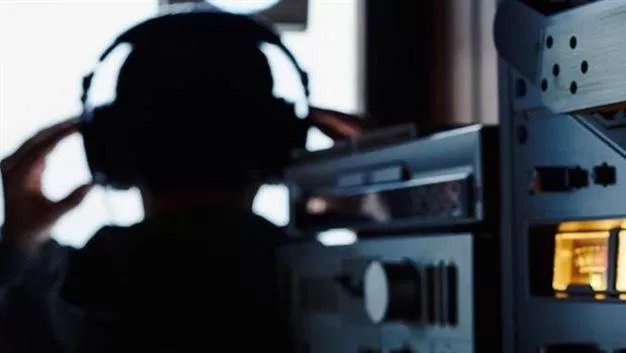
Is the recent hunt on alleged Russian spies a cunning attempt to conceal the Kremlin ties with people around President Djukanovic? Djukanovic and his chief advisor Milan Rocen are accused of being the prime Russian asset in the country
Montenegro Parliament’s Security and Defence Committee held a public hearing over the recent operation of the country’s National Security Agency (NSA) which allegedly was conducted together with its “western partner services”. Reportedly tens of Russian spies were arrested. However, the public hasn’t heard a single Russian spy name. Only the name of a retired Foreign Ministry official Radomir Sekulovic and his best man came out. Mr Sekulovic was allegedly the head of Russian spy network in Montenegro. At the end, instead of espionage, the aforesaid two men have ended up being charged for illegal possession of a pistol and a few bullets. Some media published “reliable NSA information” that Sekulovic “had confessed everything” and therefore he was spared from indictment. Sekulovic publicly denied the charges.
Espionage and connections with intelligence services has been a valued business in Montenegro since the Ottoman days and perpetuated under Yugoslavia’s strongman Josip Broz Tito. Although the Montenegrins made up only about 2.5 percent of the Yugoslav population, the share of high-ranking Montenegrins in the security services in post-war Tito's Yugoslavia was almost ten times the average. When Tito broke with Stalin in 1948 many Montenegrins were sacked and arrested for siding with Russia. The infamous concentration camp in Goli Otok (remote island in Croatia) received a disproportionately large number of Montenegrins. Many ended up there only due to false reports and snitching since those loyal to the Yugoslav regime worked hard to turn in as many “enemies of the people” as possible. The legacy of Goli Otok has left a deep mark in the national identity of Montenegro in the following decades.
The euphoria of working for spy agencies returned big way with the “Anti-bureaucratic Revolution” in Montenegro and its “spontaneous protests” in 1990 organized by the Serbian intelligence service (UDBA) under Slobodan Milosevic and his Yugoslav Army Counterintelligence Service (KOS). The result was the installation of Momir Bulatovic, Milo Djukanovic and Svetozar Marovic to run the puppet regime in Montenegro. In the fervour of Greater Serbian nationalism and the unfolding war, the notorious trio persecuted everyone who was considered pro-western, liberal and democratic. Journalists, human rights activists, opposition leaders and anyone who opposed war, mafia and corruption were regularly labelled as CIA, MI-6, and BND collaborators. On the other hand, Serbia, Russia, and China were role models.
Now, formally speaking, the situation is reverse. Once dominant Democratic Party of Socialists (DPS) and its leader Milo Djukanovic cry about “malignant influence” of Russia and Serbia everywhere. Moreover, they claim that they fight against the new enemies together with “partner services” – the same CIA, BND and others which the DPS once termed as “enemies of Serbian people and Montenegro”. However, the Chinese Communist Party (CPK) remains revered by both President Djukanovic and his archenemies in the Democratic Front (DF). Both Djukanovic and the DF leaders sent warm regards and praises to the Chinese for the recent CPK Congress.
The public hearing before the Parliament’s Security and Defence Committee (SDC) held on October 28 largely resembled the well-known television comedy – Balkan Spy. SDC summoned the recently sacked National Security Agency’s (NSA) chief Savo Kentera and the dismissed Foreign Minister Ranko Krivokapic. The idea was to review the recent NSA operation allegedly conducted with “Western partner services”. According to Mr Krivokapic’s statement at the time of the alleged operation “dozens (of spies) have been apprehended”. At the end, it was much ado about nothing.
The news outlets further reported that among 28 “Russians” who were declared personae non gratae, several of them were actually Serbian citizens. The first on the list is Vladimir Bozovic, the (pro-NATO) ambassador to Montenegro who was already declared persona non grata in the last days of the outgoing Djukanovic-led government in 2020. Others are Vladimir Mandic– a former Serbian handball national team player and Dane Sijan – also famous handball goalkeeper in the former national team of Serbia and Montenegro. The list reportedly includes prominent church figures – Podgorica archdeacon Velibor Dzomic and Dajbabe Monastery Abbot Danilo. Dzomic used to coordinate the Legal Council for the Diocese of Montenegro and was often seen in the company of Djukanovic's tycoons. In addition to the aforesaid, six employees of the Russian Embassy in Podgorica were expelled. Thus the official embassy staff came down to the ambassador and his chargé d'affaires.
The SDC chairman and one of the leaders of the Democratic Front (DF), Milan Knezevic accused Djukanovic-faithful ex NSA boss Kentera for “targeting the entire Serbian nation and its priests” and added that Kentera was “a registered CIA agent”. Knezevic pointed out that “if anyone should be arrested and interrogated that’s none other than Milan Rocen. He is the chief Russian operative in Montenegro”. Mr Rocen is top Djukanovic’s advisor in charge of his foreign policy and capital investments. He was also the protégé of arrested and then released Mr Sekulovic.
Former foreign minister Krivokapic accused Knezevic of “following orders from outside”, alluding to official Belgrade and the Kremlin. Knezevic retorted that whoever claimed that he worked for foreign interests is “a damn liar and a scoundrel”.
The former NSA chief Kentera said at the beginning of his testimony that his late father had built a church to St. Sava in Pastrovici, whereas he attended church services when others did not dare (in communist days). He added that “those who have no respect for this state, her institutions and the system should have no business here”. Kentera explained that “all those names were put on the list for a reason”. Kentera, just like Krivokapic before, tried to connect his sacking with the alleged operation against the Russian spy ring. “We started to eliminate the spy network but we were eventually foiled in the middle of it” Kentera said.
Prior to being appointed to head the NSA in a compromise between reformist Prime Minister Dritan Abazovic and his opponent President Djukanovic, Kentera was heading the Atlantic Council of Montenegro (ACofM) for many years. He was often seen in the company of American and other Western diplomats and officials of the Alliance. Kentera-led NGO was formally propagating Montenegro’s NATO accession. ACofM also received generous donations to set up the Digital Forensic Center (DFC), which was meant to fight disinformation and promote Western values.
However, in mid-September 2021, DFC published a detailed study of Russia's Influence in the Balkans – The Case of Montenegro. The Study was translated and distributed to foreign diplomats by DPS officials. The contents of the Study on Russian malign influence in Montenegro pretty thoroughly rely on DPS party communiques and the narratives of the former Chief Special Prosecutor Milivoje Katnic (who was previously a loyal military counterintelligence official under Slobodan Milosevic).
The DFC study “studiously” avoided any reference to well-known links of Djukanovic’s and his DPS with Russian intelligence, mafia and oligarchs. DFC conveniently dropped to mention that Russia was the key international player which supported Montenegrin independence back in 2006 and that disgraced Trump’s campaign chief Paul Manafort had been hired with Russian money to campaign for Montenegro’s independence. The DFC pointed to the cooperation agreement of Milan Knezevic’s Democratic People's Party (DNP- part of the Democratic Front coalition) signed with Putin's United Russia. On the other hand, the DFC skipped to mention that Djukanovic’s DPS had signed the same strategic cooperation agreement with Putin's party already back in 2011 and has never revoked it since. Then DPS spokesman Rajko Kovacevic (and later Djukanovic’s chief of staff) said “that DPS does not recognize the (Putin’s) party as dictatorial. United Russia is a party that has 315 out of 450 deputies in the Russian Duma. Thus we are the right address for talks and strategic cooperation and interests that we want to develop”. The DFC also bypassed a large number of State Department reports on Russian money laundering in Djukanovic's fiefdom and the installation of Russian intelligence agents in the state institutions of Montenegro under Djukanovic-led government. Furthermore, the DFC study does not contain a single word about havoc wreaked in Montenegrin economy by KGB/FSB “investors” who had taken over Podgorica Aluminium Plant (KAP), Niksic Steel Mill and prestigious hotels on the coast. The Russian “investors” walked away with hundreds of millions of euros and left further hundreds of millions of debts – all with the blessing of the supposedly pro-EU and pro-NATO DPS authorities. The property of Oleg Deripaska is still intact and safe in Montenegro even though Deripaska is under Western sanctions introduced after Russia invaded Ukraine in February this year.
It is also interesting that all To Be Secure (2BS) conferences of the Atlantic Council and Mr Kentera were held in Hotel Splendid. Its founder and majority owner is none other than the former director of the KGB/FSB General Viktor Ivanenko. His ownership is easily verified by a simple check in the public business registry – CRSP. The fact that a retired chief intelligence officer of Russia owns a prestigious hotel chain in Montenegro seems to be totally irrelevant to Kentera’s Atlantic Council and thus unworthy of a single reference in the DFC Study. Moreover, the profile of widely known main hotel guests and tenants who are from the same criminal and intelligence milieu is something that the DFC study chooses not to mention at all. Perhaps this is among the reasons why the main Western embassies have been very silent on the dismissal of pro-Djukanovic Kentera, Ranko Krivokapic and Rasko Konjevic (former defence minister). In informal conversations with Monitor, several diplomats from the old members of the Alliance pointed that the main Russian influence in Montenegro was still exercised through people in Presedent Djukanovic’s inner cirle “because the lucrative ties with the Russian mafia and intelligence are not something that you easily cut off, despite sweet-talking rhetoric”.
Andrija Mandic –another leader of the pro-Russian Democratic Front (DF) indirectly admitted at the public hearing that Russia prefers Djukanovic’s DPS over his political organisation for strategic cooperation whereas his DF is reduced to the role of “useful idiots” (KGB terminology). “While we were fighting the biggest battle to preserve our common state (with Serbia), do you know who was supporting independent Montenegro? Exactly those (Russian) partners of Milan Rocen” adding that the DPS “didn't mind their help to achieve independent Montenegro… the (intercepted) phone conversations have been published, there’s evidence and now you play completely dumb and point finger at us”. In addition, Andrija Mandic implicitly admitted that during so-called coup d'état trial the Serbian services were actively helping Djukanovic and Katnic (former Chief Special Prosecutor) by supplying them the so called evidence.
Moreover, Mr Mandic compared the current role of Mr Rocen to the role of Tito's chief intelligence officer, Ivan Stevo Krajacic. He explained that “after Krajacic's death, Russian agents came to take over his radio station which he used to report to Moscow frequently”. Thus, “what Stevo Krajacic used to be in Tito's Yugoslavia, now is Milan Rocen in Montenegro”. Mandic added that Mr Rocen is “the main protagonist of (Kentera's) values” with whom he chases “alleged Russian agents around Montenegro and play double and triple games of all kinds in the security services theatre”. Mandic further revealed what socializing with foreign diplomats looked like from his side during August 2020 elections saying that “the lead person on our list (former PM Zdravko Krivokapic) could hardly wait (after electoral victory) to go to the American embassy and ask what he should do”.
The pro-Djukanovic and the pro-Serbian media in Montenegro have been visibly silent on allegations against President Djukanovic's chief adviser Milan Rocen that he is the actual head of the Russian spy ring in Montenegro. DPS-controlled media are silent about its ties with Russia, while pro-Serbian portals find it hard to digest that much beloved Putin prefers Milo over Montenegrin Serbs. So far, the Prosecutor's Office hasn’t responded to direct calls of the Prime Minister Dritan Abazovic and the DF leaders to investigate Rocen’s and Djukanovic’s links with Russia.
Memory of love
Despite the strategic orientation of Montenegro, relations with Russia will always be among the mainstreams of our strategic foreign policy. No one can replace Russia – neither the European Union nor NATO. These are not empty words – Milan Rocen (RIA Novosti 2007)
Jovo MARTINOVIĆ
Komentari
IN ENGLISH
THE CASE OF PODGORICA BASIC COURT JUDGE MLADEN GRDINIĆ: Promotion and privileges in exchange for protecting interests of Žugić and Medenica
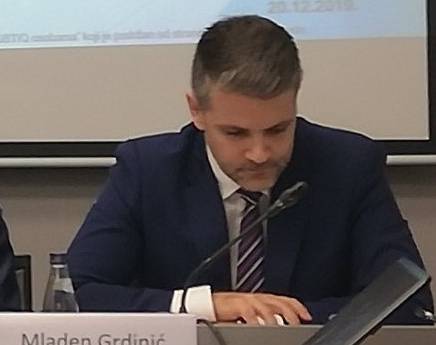
After suspicious actions in cases in which Vesna Medenica, Radoje Žugić and the DPS are interested, judge Grdinić was rapidly promoted and gained privileges. According to the Agency for the Prevention of Corruption, Grdinic's property has multiplied in just one year.
Judge Mladen Grdinić dismissed my lawsuit for discrimination against the Central Bank of Montenegro (CBM) and the Governor Radoje Žugić in its entirety as unfounded. With such a verdict, Grdinić gave the Governor, but also every other employer in Montenegro, freedom to implement nepotism and employ according to unknown criteria. The High Court and the Supreme Court revoked this verdict and the case was remanded for retrial after almost four years, Ivan Jović, a former employee of the CBM, told Monitor.
This week, Jović's retrial is taking place before the Basic Court in Podgorica and Judge Grdinić against the CBM and the Governor Žugić as the employer.
He explains that he filed the first lawsuit in October 2017, after a series of unsuccessful attempts to resolve the dispute within the CBM. “After 13 years of dedicated work in the Financial and Banking Operations Division – International Payments Operations Department, with the arrival of Radoje Žugić as the Governor in the second term, my job was deleted overnight, with no prior notice, explanation and most importantly – needlessly. I had not a single reproach from my superiors, and I do have over 20 certificates from trainings attended in central banks in the European Union, sent to by the CBM herself, investing significant funds in my professional development” says Jović.
In addition to the basic lawsuit, he simultaneously filed two initiatives with the Constitutional Court of Montenegro to assess the constitutionality and legality of the CBM Rulebook on the Organization of jobs, promulgated by the Governor Žugić. Those initiatives were rejected, and the Constitutional Court never considered the constitutionality and legality of the Governor's actions. Shortly afterwards, Žugić hired the son of “presiding” Constitutional Court judge Desanka Lopičić, Janko Lopičić.
In his testimony before Judge Grdinić, Jović explained that deleting his job and transferring him to another job, in a department not related to his previous professional engagement, with a significant reduction in earnings, was an clear act of arbitrariness of the Governor Žugić. “I was only the collateral damage of the Governor's clash with the then director of the Financial and Banking Operations Division, Mr Idriz Ćetković. By the decision of Governor Žugić, the director was dismissed overnight, forced to retire, and I, as one of his closest associates, was downgraded” Jović added.
According to the claims of the former CBM employee, Judge Grdinić at the main hearing did not allow the discussion on the identities of the CBM employees, i.e. their friendly and family ties with the Governor and the CBM management. Such actions, Jović notes, protected the interests of the Governor and prevented proper determination of the relevant facts. The verdict of the Supreme Court, Monitor had insight into, also reads that Judge Grdinić passed the first-instance verdict with a significant violation of the provisions of the civil procedure and the absence of reasons for decisive facts.
This is the third case assigned to the Judge Grdinić, which refers to Governor Žugić and the CBM, assigned in a period of only two years.
In May 2016, he rejected Žugić's lawsuit against the daily DAN, for mental suffering caused by reputation damage, by which he demanded 15 thousand euros in compensation for non-pecuniary damage due to the headline entitled “Žugić received his doctorate in a non-existent study“. Although he rejected Žugić's claim with the verdict, Grdinić still protected him, in a way that he excluded from the verdict and completely marginalized certain material evidence obtained in the court proceedings. The case of the disputed doctorate was not forward to the prosecution by the judge Grdinić, who ought to have done it ex officio. “For insisting on elements of a criminal offence relating to the Žugić's invalid doctorate, lawyer Nebojša Asanović was publicly arrested, handcuffed and detained for alleged tax evasion, based on a criminal lawsuit by Siniša Kovačević, the chief tax inspector appointed by Žugić when he was the finance minister. He is Žugić's brother-in-law, brother of Žugić`s spouse Milanka-Mira Žugić, explains Monitor‘s well-informed source.
It's worth reminding: only three months ago, Judge Grdinić also rejected the lawsuit of the former CBM Vice Governor, Irena Radović, in its entirety as unfounded. She, as Monitor wrote earlier, filed a lawsuit against the Governor and the CBM for discrimination and mobbing in 2018, months prior to her dismissal in the Parliament. During the two years and four months that the dispute lasted in the first instance with Grdinić, Radović's attorneys asked for his exemption, due to bias. According to Monitor‘s sources, the President of the Court, Željka Jovović, the godmother of the President of the Supreme Court, Vesna Medenica, rejected the request for his exemption.
After such actions, Judge Grdinić became the Vice President of the Basic Court in Podgorica in June 2019, although he slipped into the judicial toga for the very first time at end-2015, based on the decision of Medenica and the Judicial Council. Simultaneously, Željka Jovović was appointed president of the Basic Court.
In the short period following his assignment and with the achieving of good results in the cases in which Medenica, Žugić, DPS were interested, Grdinić was progressing rapidly and gaining privileges.
According to the Agency for Prevention of Corruption data Monitor had insight into, Grdinić's property multiplied in just one year.
According to the property card reported to the Agency in 2018, Grdinić had only 1,100 euros in his current account and had no real estate. Only a year later, the judge's property card indicates a monthly income from rent in Kolašin in the amount of 3,000 euros a year, without prior registered real estate, i.e. on what basis he earns income from renting out. According to the property card from 2019, Grdinić had an inflow of 31,300 euros, also without reporting where that income came from. Two months later, he reported the vehicle as an increase in assets beyond 5,000 euros – a Peugeot 508 1.6 HDI, again without explanation.
In May 2020, Grdinić took over the keys to the apartment obtained on favorable terms. In the property card reported to the Agency on 10 March 2020, he reported an apartment of 48 square metres with a housing loan of 16,000 euros. Only a day later, he reported a membership in the Steering Committee (SC) of the Commission for Implementation of Child-Friendly Legal Aid, with remuneration of 375 euros. In the meantime, in August 2020, only nine days after passing the verdict in favour of Žugić/CBCG in the Radović case, Grdinić was appointed to the four-member Board of the Mediation Center to represent the Basic Court in Podgorica, with a monthly allowance not yet reported to the Anti-corruption Agency, although four months have passed since his appointment to the new position.
Grdinić's success in judicial circles is linked to Medenica. According to allegations of those close to Judge Grdinić, Medenica did her internship with Judge Grdinić's father in Kolašin. She worked closely with him for years during her career in the Kolašin judiciary and prosecutor's office. First in his capacity as a judge, then as a lawyer.
Close relations of Žugić and Medenica are not unknown to the public. It was discovered that they have villas next to each other in the seafront in Krašići. The international public's attention was drawn to Medenica's legal position that officials dismissed in Parliament do not have the right to judicial protection before regular courts, which contributed to protecting the interests of the then ruling DPS majority and the Governor Žugić. Žugić also assisted in the businesses of the children of the President of the Supreme Court. Miloš Medenica got his first job for trading in oil derivatves, linked to the company named „Timi“ during Žugić's term of office as the Minister of Finance. In the meantime, the Investment and Development Fund (IRF), which is controlled by the CBM and Governor Žugić, approved and implemented via Prva banka two favourable credit arrangements of almost 400 thousand euros to the same company owned by Medenica's son. Medenica, as the supreme state prosecutor, thwarted the indictment of Žugić on at least two ocasions, while he was the director of the Pension Fund including for the controversial privatisation of Maritime Transport company in 2004.
What can Ivan Jović expect from the new trial on Thursday, when this issue of Monitor goes to press?
HOW ŽUGIĆ AND CBM TAKE CARE OF THE JUDGES’ CHILDREN IN PARALEL WITH RELATIVES, FRIENDS, BEST MEN
“A significant number of children of Montenegrin judges are employed by the CBM,” Monitor source stressed.
The son of the Supreme Court judge Radojka Nikolić, Marko Nikolić, also works in the CBM, in banking supervision. Žugić awarded director positions to the daughter and son-in-law of Supreme Court Judge Dušanka Radović, Marija and Rajko Sekulović. As the Monitor's source explains, Žugić is in a direct kinship relationship with Judge Radović. The husband of the judge of the Supreme Court Nataša Božović, Srđa Božović, is also sitting today in the Advisory Board of the Governor of the CBM with monthly remuneration. Previously, he was a member of the CBM Council for a full eight years, with a monthly fee of one thousand euros in net amount.
Both daughters of the Supreme Court judge Svetlana Vujanovic and Filip Vujanovic, former triple president of Montenegro, prime minister and former Minister of Justice Nina Vujanovic and Tatjana Vujanovic Vukasnovic, also work in the CBM.
After the illegal dismissal of Vice Governor Irena Radović, Tatjana Vujanović Vuksanović, but also the daughter of Prime Minister Duško Marković, Valentina Marković, were promoted. Marković was promoted to being the chief supervisor, and Vujanović Vuksanović to special advisor to the governor for representing the CBM in difficult disputes before the courts. Her sister Nina Vujanović was also, after Radović's dismissal, promoted to advisor to Vice Governor Nikola Fabris.
It is also a convenient coincidence that Tatjana Vujanović Vuksanović legally represented Žugić in Radović's dispute against him and the CBM before Judge Grdinić. Besides her, Žugić's representative in the same dispute is Ana Đukanović, the sister of Montenegrin President Milo Đukanović, who initially defended the interests of CBM and Žugić against Radović openly and singlehandedly in June and July 2018. This can be seen from the documentation signed by the president's sister, whilst in the dispute before the Basic Court, in addition to Vujanović Vuksanović, the interests of the CBM and Žugić were formally represented by Miroslav Adžić, a lawyer who emerged from Ana Đukanović's office.
Andrea JELIĆ
Komentari
IN ENGLISH
SILENT KILLER: DRUG ADDICTION AMONG YOUNG PEOPLE IN MONTENEGRO: Growing Hopelessness

Young people in Montenegro can reach dugs within half an hour. They often consume it in school backyards, most commonly marijuana, and the use of heavy psychoactive substances is increasing. Many of them suffer from psychological disorders. Monitor's interviewees agree that we don’t talk about this enough, and that we lack support of the society as a whole.
“They use drugs wherever they can, mostly in the schoolyard. They choose places where cameras can't capture them, and those who want to get “stuff” turn to them. In most cases, it is marijuana”, said student A.S. from Electro-Technical High School Vaso Aligrudic in Podgorica.
Last year's research of the Ombudsman Children and Addiction Diseases in Montenegro showed as well that drug addiction is one of the burning problems of young people in Montenegro. According to the research, which included 37 elementary and 25 high schools, marijuana was used by more than 11 percent of students, while on average, more than eight students consumed heavy drugs. “Half of drug addicts use one substance and the other half use two or more substances. Students in Montenegro use significantly more illegal (heavy) drugs than the EU average”, the study said. As many as 16 percent of students said that illicit substances were often consumed at school, and besides, there was an increase in the use of synthetic drugs, which are cheap and easily available.
“Those for whom I know that use marijuana do it behind the school. They did it before on the fire stairs. The most problematic is easy availability of drugs”, said student Z.K. from Economics High School Mirko Vesovic in Podgorica. More than 25 percent of the students that participated in the Ombudsman's research reported a similar view. If one wants drugs, it will take him half to several hours to get it, which is disturbing.
Dijana Milosevic, from Public Institution Kakaricka Gora, an institution for accommodation, rehabilitation and re-socialization of users of psychoactive substances in Podgorica said for Monitor that it generally began with marijuana “The adolescence itself, is the greatest crisis period of each individual, when identity problems naturally appear, difficulties in accepting authority, as well as a tendency to experiment with “forbidden things.” All these are favorable conditions for an adolescent to come into contact with psychoactive substances. There is a persistent misconception among young people that marijuana is not a drug or that it is an “easy drug” which facilitates entering into problem. Most often marijuana is the first substance that addicts consume. Besides consequences which it leaves on the psyche of the consumer, this is a misconception that can cost them their lives”.
According to her, the reasons why young people use drugs are mainly dissatisfaction, concern or rebellion against authority, boredom, family problems, peer violence as well as opinion that cigarettes, alcohol or drugs are some kind of “gateway” to a certain group of peers.
“Behind our school sports hall, you can often see older guys who give marijuana to children. It happens almost every day and its favorite gathering place”, told us another student of Electro-Technical High School Vaso Aligrudic.
Monitor addressed this issue to most of the high schools in Podgorica. The question what they did to restrain this problem, even after weeks of waiting, has not been answered.
“We do not work enough in schools with adolescents, when it comes to drug addiction. However, the reason for that is not in schools, but rather in insufficient involvement of institutions, which should tackle more with this problem. We cannot expect from schools to deal with the education of children and to be a police officer and someone who, among other responsibilities, will work with children on restraining this phenomenon. That is why they need help from both the institutions and the civil sector. Everybody has to deal with this phenomenon. Every year its presence in educational institutions is increasing”, said to Monitor NGO Euromost, whose main goal is to support fight against drugs abuse and all forms of addiction.
Drug abuse increased everywhere in the world, and the same happened in our country, regardless of the actions taken through health, educational, legal system, noted psychologist Natasa Vukovic, who works with peer educators as a part of NGO Euromost actions. “The number of drug users is becoming more noticeable among young people, among high school students and even elderly elementary school students. There are no harmless drugs. The continuous, systemic and systematic action of the whole society is necessary. The aim above all must be that children and young people never turn to drugs”.
According to her, inadequate assistance and lack of support from the family, primarily parents, who have failed to maintain a relationship of trust with their children, and who have failed to “impose” desirable role models, make young people an “easy target”.
“Eighteenth birthday celebrations are particularly problematic. Sometimes flats, where they mix two or three types of drugs and large amounts of alcohol, are being rented. Mostly, this refers to grammar school graduates. My daughter went to one such birthday celebration and she called me to pick her up, shocked and dreadful. She didn't know what was going on there. And parents have no idea”, said for Monitor Patricija Pobric, Director of NGO Our Action.
She claims that a deeper involvement in drug addiction is often preceded by some criminal acts: “Usually, as of the third grade of high school, young people are recruited to buy ID cards by older students. These kids turn to drugs afterwards. They are “carriers” and it’s easy to involve them in petty crimes. They later buy motorcycles and cars from that money “.
Many start using drugs because they expect that it will help them deal with problems on a daily basis. Many start out of curiosity, with the well-known – ‘I will just try it’. Asked why someone became an addict and someone did not, especially if persons grew up in similar circumstances or even in the same family, Natasa Vukovic said that there was no clear and definite answer: “The only certain conclusion is that you should clearly advise everyone not to try psychoactive substance because one does not know in advance whether he/she is sensitive to it, which would mean that even a single intake already creates a psychic need for re-taking it. Such patients exist in practice, and they have a common characteristic that they “immediately liked the drug”.
Euromost noted that in addition to combating drug trafficking, we should work also on improving prevention of drug addiction among youth: “Upon completing the training of the first peer educators, Euromost, besides Bijelo Polje, has expanded its workshops to other northern municipalities, such as Plav, Gusinje and Rozaje. The number of participants is the best indicator of youth interest. However, in order for this to be successful, it is necessary to constantly communicate with young people and listen to what they have to say. It is not really useful just to find an expert who will explain them what the drug is and how it looks like”.
Natasa Vukovic, pointed out for Monitor, that addiction can be closely related to young people’s mental problems. Mind and mental healthcare is still a taboo topic in Montenegro. “It is true that in recent years more and more young people have sought help and advice of psychologists, but still shyly, almost always asking for visits not to be evidenced, and that parents do not find out about it, because it is often very difficult for them to accept the fact that their child goes to a psychologist or psychiatrist”, she said.
The state has similar approach. “There is no institution in our country where young people with a mental illness can be treated”, warned Vukovic.
In Montenegro, National Register on Drug Addiction has been maintained since 2013 by the Institute for Public Health, but it functions only on the basis of data collected from health institutions. There is no information about those who are not reported. According to recent estimates, there are more than 15,000 drug addicts in Montenegro.
How many of them are young people and children is not precisely known. The results of the research are discouraging. Monitor's interviewees agree – there is a lack of communication and cooperation between institutions, schools, parents and young people. And the problem of addiction is not the problem of the individual, but of the whole society.
Milo Popovic and Andrea Jelic
Komentari
-
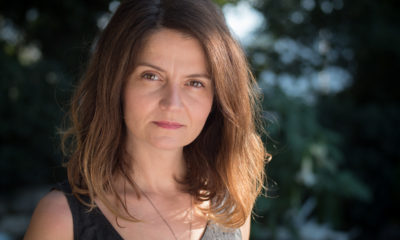
 INTERVJU4 sedmice
INTERVJU4 sedmicePAULA PETRIČEVIĆ, MIROVNA I FEMINISTIČKA AKTIVISTKINJA: Osokoljeni nacionalistički šerifi se ne boje institucija sistema
-
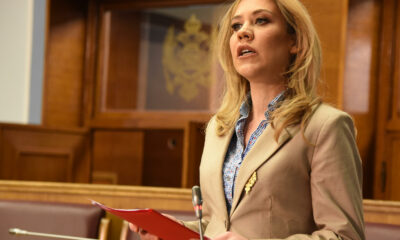
 DRUŠTVO5 dana
DRUŠTVO5 danaAKO JE VESNA BRATIĆ IZABRANA U ZVANJE REDOVNE PROFESORICE UCG: Komisija po resavskom modelu
-
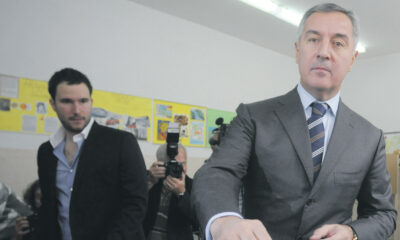
 FOKUS3 sedmice
FOKUS3 sedmiceFAMILIJA ĐUKANOVIĆ NAKON GUBITKA VLASTI: Manje moći, manje profita, ali poslovi traju
-
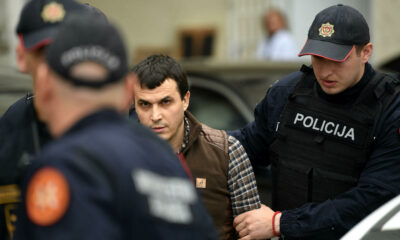
 DRUŠTVO4 sedmice
DRUŠTVO4 sedmiceHAPŠENJE IGORA KRSTOVIĆA: Jedna lasta ne čini proljeće
-
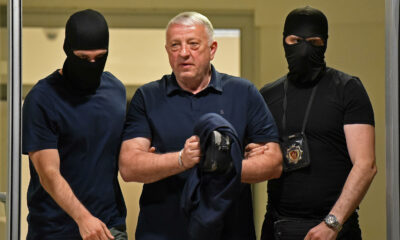
 FOKUS5 dana
FOKUS5 danaHAPŠENJE ZORANA LAZOVIĆA I MILIVOJA KATNIĆA: Odoše drugovi, samo njega nema
-

 DRUŠTVO2 sedmice
DRUŠTVO2 sedmiceEUROPOL IDENTIFIKOVAO NAJOPASNIJE KRIMINALNE MREŽE NA KONTINENTU: Mapa evropskog podzemlja
-
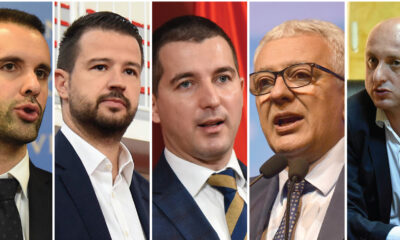
 Izdvojeno4 sedmice
Izdvojeno4 sedmiceKRIZE VLASTI OD LOKALA DO VRHA: Puca po dubini
-

 DRUŠTVO4 sedmice
DRUŠTVO4 sedmiceKONTROLA DRŽAVNIH PREDUZEĆA: Prepuštena sama sebi i partijama










